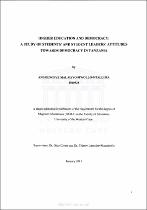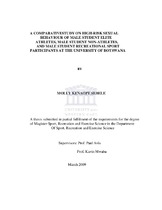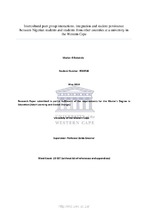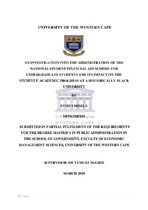| dc.description.abstract | Students in African universities have a long history of political involvement at the institutional level and in national politics. The present study investigates the political opinions of students in Tanzania with respect to (1) their attitudes towards democracy and how these attitudes could be explained, (2) student satisfaction with the way their university and their country, Tanzania, are governed, and (3) whether student leaders (SL) have more democratic attitudes than students who are not in formal student leadership positions (SNL) and if there are other relevant groups that can be identified whose political attitudes differ significantly from those of other groups. The study draws on the work of Bratton, Mattes and Gyimah-Boadi (2005) and employs a survey questionnaire adapted from the Afrobarometer. Using survey data collected at the University of Dar es Salaam in Tanzania, a number of questions are investigated, and related hypotheses are tested in order to determine the extent to which students understand and demand democracy, how they perceive the supply of democracy, and what their attitudes are towards university governance and national politics in general. Overall, the study has found that students clearly understand what democracy is and are very supportive of democracy. This support, however, is opined within a context where they are dissatisfied with the way governance operates within the university as well as at national level in Tanzania. Democracy is therefore seen as an ideal which is not fully realised in the current situation. It is significant that, firstly, students have a good understanding of democracy in a wider perspective by conceptualising democracy mostly in procedural rather than substantive terms and by rejecting non-democratic alternatives, and they support popular representation at all levels of decision-making. Secondly, students are not satisfied with the way student
representation and governance operates in their university; they demand more democracy in the University Students' Representative Council (USRC) elections; they support representative university governance and demand more accountability from student leaders and university
management. Lastly, it is seen that between SL and SNL there are no significant differences in their respective conceptualisation of, and support for, democracy, and both groups show equal dissatisfaction with the way democracy operates in Tanzania. | en_US |




